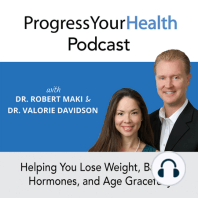1 min listen

What Type of PCOS Do I Have? Common | PYHP 064
What Type of PCOS Do I Have? Common | PYHP 064
ratings:
Released:
Sep 27, 2019
Format:
Podcast episode
Description
In this episode, we continue talking about PCOS. As mentioned in the previous episode, we have seen three main types of PCOS. PCOS is more of a spectrum of symptoms. Some women have most of the symptoms of PCOS and others just a few. The varying degree of hormonal imbalances will help mold the three types of PCOS that we have seen. Many doctors that treat PCOS all can agree that there are different types of PCOS.
The three types that we have found with PCOS are:
Classic
Common
Concealed
In this episode, we are going to talk about the Common-Type of PCOS. In the previous episode, we spoke about the Classic type. And in the next episode, we will go over the Concealed Type.
The reason that we want to differentiate the Types of PCOS is because, in each type, there are different health goals, health consequences, and multiple treatment plans.
Common PCOS: This is the most common type of PCOS seen. The Common-types should be diagnosed fairly easily. But because they do not fall into the Classic presentation, they may get missed in diagnosis.
Symptoms that a PCOS Common-type will present with:
Easy weight gain in the middle, the stomach, and the hips and thighs
Thinning hair
Irritable easily
Some cystic acne on the chin and jaw area
Trouble getting pregnant but is usually successful with fertility options or IVF
May get random cysts on or in the ovaries. But there is no string of pearls or multiple ovarian cysts.
May miss a period occasionally. Common-types are not regular in their periods. But they may get a period every month for five months then miss two. Or have very long cycles up to 45 days. Or they may have a period every other month. Common-types again, are not regular, but they do not miss multiple months like the Classic Types PCOS.
Typical lab work for a PCOS Common Type:
LH is double the FSH
There is high normal to just slightly over the normal level of testosterone
High normal DHEA-sulfate
Insulin is in the normal range but may show up in the teens or anywhere above 9.
Normal glucose
Estradiol can be high, showing Estrogen-dominance or be normal ranges
The three types that we have found with PCOS are:
Classic
Common
Concealed
In this episode, we are going to talk about the Common-Type of PCOS. In the previous episode, we spoke about the Classic type. And in the next episode, we will go over the Concealed Type.
The reason that we want to differentiate the Types of PCOS is because, in each type, there are different health goals, health consequences, and multiple treatment plans.
Common PCOS: This is the most common type of PCOS seen. The Common-types should be diagnosed fairly easily. But because they do not fall into the Classic presentation, they may get missed in diagnosis.
Symptoms that a PCOS Common-type will present with:
Easy weight gain in the middle, the stomach, and the hips and thighs
Thinning hair
Irritable easily
Some cystic acne on the chin and jaw area
Trouble getting pregnant but is usually successful with fertility options or IVF
May get random cysts on or in the ovaries. But there is no string of pearls or multiple ovarian cysts.
May miss a period occasionally. Common-types are not regular in their periods. But they may get a period every month for five months then miss two. Or have very long cycles up to 45 days. Or they may have a period every other month. Common-types again, are not regular, but they do not miss multiple months like the Classic Types PCOS.
Typical lab work for a PCOS Common Type:
LH is double the FSH
There is high normal to just slightly over the normal level of testosterone
High normal DHEA-sulfate
Insulin is in the normal range but may show up in the teens or anywhere above 9.
Normal glucose
Estradiol can be high, showing Estrogen-dominance or be normal ranges
Released:
Sep 27, 2019
Format:
Podcast episode
Titles in the series (100)
Welcome to The Progress Your Health Podcast | PYHP 01: Welcome to the first official episode of the Progress Your Health Podcast (PYHP). Previously, we published another podcast called The Dr. Rob Show, which is still on iTunes. The co-hosts of the PYHP is a husband and wife team of Dr. Robert Maki and Dr. by Progress Your Health Podcast